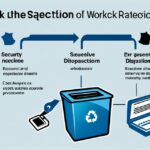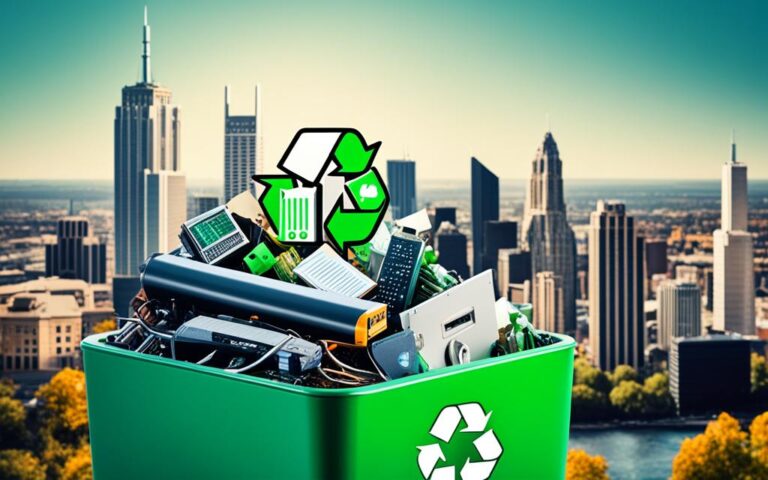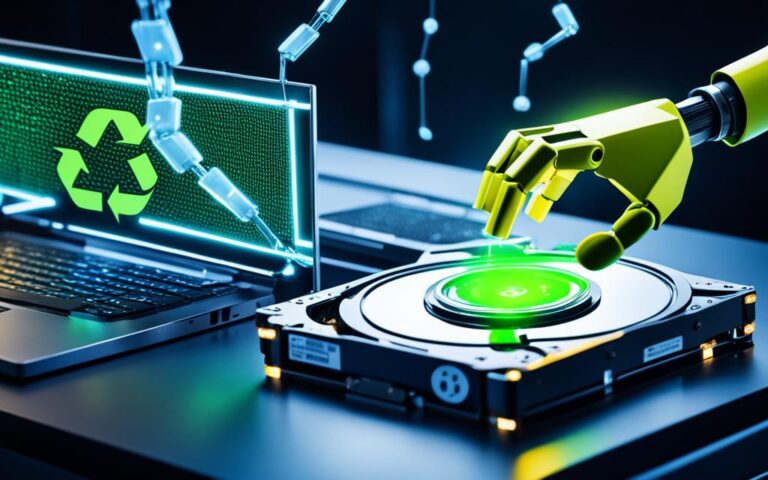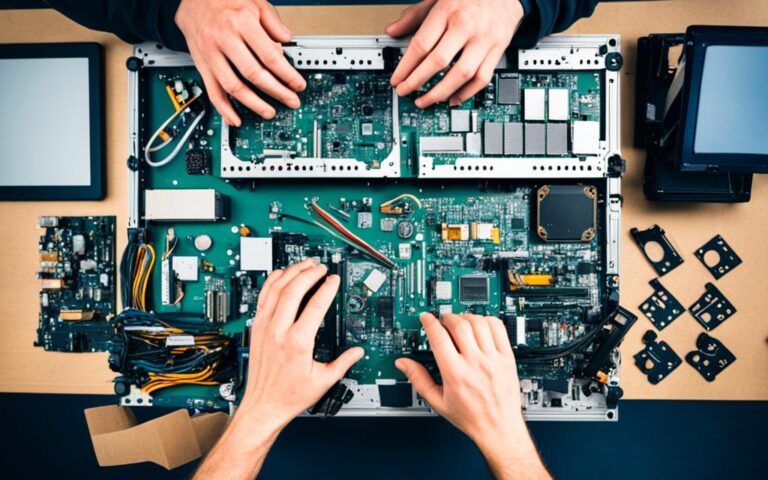Redeveloping Assets: The Potential of Recycled Computer Hardware
In today’s digital age, businesses are constantly upgrading their computer hardware, leading to a significant amount of electronic waste. However, this waste holds immense potential for asset redevelopment. By recycling computer hardware, companies can not only recover value but also contribute to a more sustainable future.
Every year, the United Kingdom alone discards a substantial amount of e-waste, including computer equipment and devices. This wastage represents a missed opportunity for sustainable practices and asset redevelopment. By embracing the potential of recycled computer hardware, businesses can tap into a growing market and make a positive environmental impact.
Global statistics indicate that only about 20% of e-waste is currently recycled. However, with the circular economy gaining traction and rising costs of primary production, the demand for recycled materials is projected to double by 2050. This presents a significant opportunity for businesses to not only reduce their carbon footprint but also localize their supply chains and improve their bottom line.
Recycled computer hardware contains valuable components such as metals like copper, gold, silver, platinum, and rare earth elements. These materials can be extracted and reused, offering a sustainable alternative to traditional mining and manufacturing. By leveraging this resource, companies can diversify their supply chains and reduce dependence on costly, non-renewable resources.
In addition to the environmental benefits, responsible disposal of e-waste is crucial for data security. Improper disposal can lead to data breaches and unauthorized reuse, putting businesses at risk. By working with certified recyclers and following proper disposal procedures, companies can ensure the protection of sensitive information and comply with data protection regulations.
Recycling programs play a vital role in facilitating the responsible disposal and recycling of computer hardware. These programs provide clear guidelines for preparing and delivering e-waste, ensuring that it is handled and processed correctly. By adhering to these guidelines, businesses can maximize the environmental and economic benefits of recycling, while minimizing their ecological footprint.
In conclusion, by redeveloping assets through the recycling of computer hardware, businesses can unlock a range of benefits. From value recovery to meeting sustainability goals, the potential is vast. By embracing circular materials, responsible recycling programs, and data security measures, companies can contribute to sustainable tech practices and pave the way for a greener future.
To learn more about proper server recycling in the UK, visit server recycling UK.
The Value in E-Waste
E-waste generation is expected to double by 2050, reaching 110 million tons globally. The average smartphone is replaced every 2.2 years, contributing to the growth in e-waste. However, only about 20% of e-waste is recycled worldwide.
Companies can benefit from the value recovery and feedstock sourcing of e-waste materials, including metals like copper, gold, silver, platinum, and rare earth elements.
“Recycling e-waste can significantly reduce the demand for new materials and help conserve natural resources,” says Jane Adams, sustainability expert at GlobalTech Solutions.
“Circular materials are becoming increasingly valuable in a resource-constrained world. By reclaiming and recycling e-waste, companies can reduce their dependence on virgin resources and contribute to a more sustainable future.”
In addition to reducing the environmental impact, responsible e-waste recycling also helps companies meet their sustainability goals and reduce emissions.
Unlocking the Value of E-Waste
Recycling e-waste allows companies to recover valuable resources that can be reused in the production of new products. The circular economy approach promotes the concept of turning waste into feedstock, ensuring that materials are kept in circulation and do not end up in landfills.
E-waste contains a wide range of valuable materials, including metals such as copper, gold, silver, platinum, and rare earth elements. These materials can be extracted from discarded electronic devices and used in the manufacturing of new products.
By incorporating recycled materials into their production processes, companies can save costs and reduce their reliance on finite resources. In addition, using recycled materials can help mitigate the social and environmental risks associated with mining and extraction activities.
The Benefits of Responsible E-Waste Recycling
Responsible e-waste recycling goes beyond just extracting valuable materials. It ensures that hazardous components, such as batteries and toxic chemicals, are safely disposed of or treated to prevent environmental contamination.
Recycling e-waste also helps to reduce the amount of waste that ends up in landfills, conserving valuable landfill space and mitigating the associated environmental risks. Furthermore, recycling e-waste reduces the energy consumption and greenhouse gas emissions associated with the production of new materials.
“By recycling e-waste, companies can actively contribute to a more sustainable and circular economy. It’s a win-win situation for the environment and the business,”
adds Adams.
Responsible Disposal and Data Security
Proper disposal of e-waste is crucial to prevent environmental pollution and protect data security. Failure to dispose of electronic equipment correctly can lead to significant consequences, including fines, data breaches, and unauthorized reuse. Ensuring the responsible disposal of electronic waste requires companies to prioritize both environmental sustainability and data security throughout the end-of-life process.
One important step in responsible e-waste disposal is backing up and securely wiping the hard drives of computer equipment before disposal. This ensures that sensitive and confidential information is not accessible to unauthorized individuals. By implementing proper data sanitation procedures, companies mitigate the risk of data breaches and safeguard their business and customer information.
When it comes to disposing of electronic waste, seeking the services of recycling centers and certified recyclers is highly recommended. These entities have the expertise and equipment needed to handle e-waste in compliance with environmental standards and data protection regulations. Moreover, they employ advanced techniques to extract valuable materials from electronics while minimizing the environmental impact.
“Proper disposal of e-waste is not just about environmental responsibility, but also about protecting sensitive data. It is crucial for businesses to prioritize the secure disposal of their electronic equipment to prevent data breaches and maintain customer trust.”
By partnering with reputable recyclers, companies can ensure that their electronic waste is processed responsibly and sustainably. These recyclers adhere to stringent protocols for dismantling and recycling e-waste, ensuring that valuable and hazardous materials are handled safely and efficiently. This approach not only helps companies meet their environmental goals but also contributes to the reduction of pollution and the conservation of natural resources.
Benefits of Responsible E-Waste Disposal and Data Security:
- Prevents environmental pollution and resource depletion
- Protects sensitive and confidential data from breaches
- Mitigates the risk of unauthorized reuse of discarded equipment
- Supports compliance with data protection regulations
- Aligns with sustainable business practices and corporate social responsibility
| Environmental Impact | Data Security |
|---|---|
| Prevents pollution and reduces the consumption of raw materials | Protects sensitive data and prevents unauthorized access |
| Conserves natural resources and minimizes energy consumption | Reduces the risk of data breaches and potential legal ramifications |
| Reduces greenhouse gas emissions and landfill waste | Maintains business reputation and customer trust |
The Role of Recycling Programs
Recycling programs play a vital role in the responsible disposal and recycling of computer hardware. These programs are instrumental in recovering valuable materials such as metals, plastics, and rare earth elements from electronic waste (e-waste). By participating in recycling programs, businesses can contribute to the circular economy and reduce their environmental impact.
One of the key benefits of recycling programs is the recovery of e-waste materials. Valuable metals like copper, gold, silver, platinum, and rare earth elements can be extracted from discarded computer equipment and devices. These materials can then be repurposed and used in the production of new products, reducing the need for primary production and conserving valuable resources.
Different recycling programs may have specific guidelines to ensure the proper preparation and delivery of hardware. These guidelines may include tasks such as removing batteries, separating components, or labeling items for identification. By following these guidelines, businesses can ensure that their hardware is processed efficiently and effectively, maximizing the potential for material recovery.
Furthermore, recycling programs play a crucial role in minimizing the environmental impact of e-waste. By diverting e-waste from landfills and incinerators, these programs help reduce pollution and greenhouse gas emissions associated with the disposal of electronic devices. They also promote responsible waste management practices, ensuring that hazardous materials are handled safely and in compliance with environmental regulations.
The Benefits of Recycling Programs:
- Reduces the need for primary production of metals and other materials
- Conserves valuable resources
- Minimizes environmental impact
- Promotes responsible waste management
- Supports the transition to a circular economy
By participating in recycling programs, businesses can not only contribute to a more sustainable future but also demonstrate their commitment to corporate social responsibility. Responsible e-waste recycling is a critical component of sustainable business practices, helping companies meet their environmental goals and build trust with customers and stakeholders.
“Recycling turns things into other things, which is like magic.” – Anonymous
To illustrate the impact of recycling programs, consider the following table showcasing the potential material recovery from e-waste:
| Material | Potential Recovery |
|---|---|
| Copper | Approximately 60-90% * |
| Gold | Approximately 90-95% * |
| Silver | Approximately 80-90% * |
| Plastics | Approximately 20-90% * |
| Rare Earth Elements | Approximately 50-80% * |
Source: *Environmental Protection Agency (EPA)
By understanding the role of recycling programs and implementing responsible e-waste disposal practices, businesses can contribute to a more sustainable future while benefiting from the recovery of valuable materials. Embracing recycling programs and following their guidelines is a crucial step towards building a circular economy and reducing the environmental footprint of electronic waste.
Conclusion
Redeveloping assets by upcycling obsolete computer hardware has significant potential. The proper disposal and recycling of e-waste can help companies recapture value, meet sustainability goals, and reduce their environmental impact.
By embracing circular materials, responsible recycling programs, and data security measures, companies can unlock the asset redevelopment potential and contribute to sustainable tech practices.
To learn more about proper server recycling in the UK, visit server recycling UK.
FAQ
What is the potential of recycled computer hardware?
Redeveloping assets by upcycling obsolete computer hardware has significant potential. It allows companies to recapture value, meet sustainability goals, and reduce their environmental impact.
How much e-waste is generated globally?
E-waste generation is expected to double by 2050, reaching 110 million tons globally.
How much e-waste is recycled worldwide?
Currently, only about 20% of e-waste is recycled worldwide.
What are the benefits of recycling e-waste?
Recycling e-waste allows materials like metals, plastics, and rare earth elements to be recovered, which can be used as valuable feedstock.
How should companies dispose of their computer hardware?
Companies should back up their data and securely wipe their hard drives before disposing of their computer hardware. They should seek recycling centers and certified recyclers to ensure compliance with environmental standards and data protection.
What are recycling programs?
Recycling programs are initiatives that promote responsible disposal and recycling of computer hardware. They recover valuable materials from e-waste and help minimize environmental impact.
Are there specific guidelines for recycling programs?
Yes, different recycling programs may have specific guidelines. These may include requirements such as removing batteries or labeling the hardware. It is important to follow these guidelines to ensure proper recycling.















